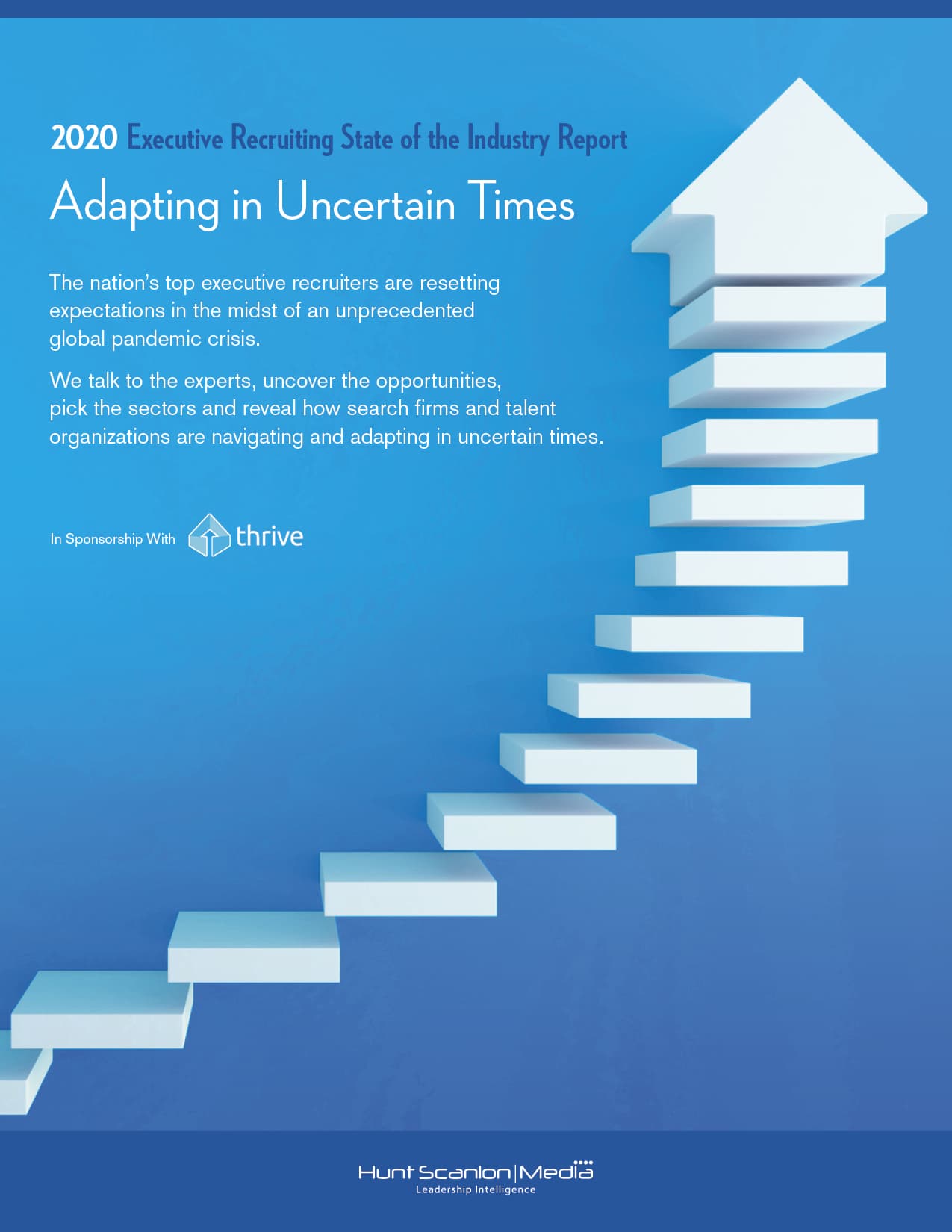Major Paradigm Shifts Coming Out of the Coronavirus Crisis

April 7, 2020 – Bound to reshape society in lasting ways, the current pandemic is shining a bright light across countless industries, unearthing both vulnerabilities and opportunities. Manufacturing, particularly in pharma, will come closer to home. Infrastructure needs more fiber and wireless access. E-commerce becomes an even more sizeable force. Telemedicine stands to see major gains. And on it goes in terms of forecasting changes across industry lines.
In a new report, executive search firm ON Partners is weighing in on what to expect across a variety of industries, including supply chain, e-commerce, private equity, telecom and telemedicine, software and life sciences. Here is what the Hudson, OH-based recruitment firm has to say about how the virus will impact key sectors and the shifting demand for leadership:
 Executive Recruiters & Talent Leaders Navigate Uncertain Times
Executive Recruiters & Talent Leaders Navigate Uncertain Times
Hunt Scanlon’s latest executive recruiting industry sector report will be available in 30 days. This will be the most important search industry sector report that Hunt Scanlon has ever produced! The nation’s top executive recruiters are resetting expectations in the midst of an unprecedented global pandemic crisis. Many expect a significant pause in business, followed by a sharp rebound later this year. We talk to the experts, uncover the opportunities, pick the sectors and reveal how search firms and talent organizations are navigating and adapting in uncertain times. Healthcare, biotech, crisis response, supply chain & logistics and the vast private equity sector are all showing signs of strength – and a big need for talent.
Hear from top talent experts, including: Frederickson Partners; CBIZ CMF; Russell Reynolds Associates; Odgers Berndtson; Options Group; ZRG Partners; Wilton & Bain; Diversified Search; Caldwell; Hanold Associates; True Search; Slayton Search Partners; Coulter Partners; Cejka Search; Solomon Page; Acertitude; McDermott & Bull; Academic Search; Beecher Reagan; Bowdoin Group; Kingsley Gate Partners; Comhar Partners; ON Partners; Perrett Laver; CarterBaldwin; Stanton Chase; Buffkin/Baker; Major, Lindsay & Africa; WittKieffer; Klein Hersh; Furst Group; Invenias; PierceGray; LifeSci Partners & more!
Insert an ad in our report, reserve your copy today and find out how you should adapt your business in these uncertain times.
Supermarket shelves are empty and yet shuttered restaurants have massive supplies they cannot use. Plants are shut down around the world, and there are major shortages of raw materials, sub-assemblies and finished goods, impacting nearly every industry segment. “Over the past 20-plus years, businesses have increasingly moved to global sourcing and lowest cost manufacturing,” the ON Partners report said. “With the pandemic impacting suppliers and delivery methods on every continent, supply-chain executives are leaning in on their crisis management plans. Supply-chain executives have lived and learned through many disruptions: 9/11 terrorist attacks, 2011 earthquake and tsunami, even health-related scares such as Ebola and SARS.”
Disruption Within Supply Chain
“They have sharpened their supply-chain risk management processes after each disruption, but we’ve never seen a disruption like this where world powers are telling their people to stay home and not work, effectively eliminating all contingency solutions,” the search firm said. “Additionally, as they move to mitigate the risks of these new challenges, longer-term questions arise: Should we bring sourcing back onshore? How much inventory do we need to tide over in this crisis? With a global health pandemic and no clear view on when or how it will be resolved, supply chain executives are scrambling for a new normal.”
According to ON Partners’ Heidi Hoffman, supply-chain executives best prepared for this crisis have more of a general management mindset, with characteristics such as:
- Big Thinking and Strategic Insight– How to alter the chain, utilize data more effectively or apply technological advancements to change the way they do business; constant evaluation of changing geopolitical and environmental forces; close connection with customer base to predict shifts in demand (expected and unexpected).
- Integrated Supply-Chain Management Expertise– Collaboration, networking, relationship management, technical expertise, risk management and change leadership within and across the function of the supply chain, as well as cross-functionally in the broader company and related parties.
- Holistic, Global Leadership– An ability to work seamlessly within and across companies, cultures, functions and geographies to drive change and action.
E-Commerce
As nervous consumers continue to turn to online shopping to avoid stores, online and Ecommerce channels will continue to grow and scale and become an even more important business channel across all markets, said the report.
“Companies will increase their percentage of manufacturing and distribution centers here in the U.S. to become less reliant on foreign governments and look to increase ways to sell and distribute online/virtually,” according to partner Marc Gasperino.
 Pandemic Crisis Forces 10 Million Americans into Unemployment
Pandemic Crisis Forces 10 Million Americans into Unemployment
Americans displaced by the coronavirus crisis again filed unemployment claims in historic numbers, with the Labor Department reporting Thursday a surge to 6.6 million. Nearly 10 million people have filed for unemployment benefits in two weeks. Economists now expect the U.S. economy to fall into a recession in the second quarter, before staging a comeback later in the year after the spread of the virus slows.
Private Equity
The private equity industry is poised to become very active as a result of the virus’ impact. Learning from the lessons of the global financial crisis, in which the industry was widely seen as having missed a major opportunity to acquire assets at steep discounts, firms are expected to be more active during the pandemic, said ON Partners.
Related: Keep Calm and Recruit: Why Now is the Best Time to Assess Your Talent…
“PE firms are getting ready to deploy capital and are ramping up, either on potential due diligence of already troubled companies or staffing up and looking for additional operating partners,” said partner Jeff Hocking. “Candidates who are currently employed will be reluctant to make a move, and companies that are hiring will really need to move fast if they want to land candidates – regardless if the company is PE backed or not.”
Telecommunications & Telemedicine
The growing need for remote communications during the coronavirus pandemic has intensified the need for next-generation technology and could potentially accelerate its adoption over the longer term. An increasing reliance on teleconferencing tools as employees switch to remote work will also boost the case for faster connectivity both at home and in the office to enable real-time uninterrupted communication.
“When we keep all employees and students at home, it shifts bandwidth demands away from the high capacity buildings and offices to the neighborhood level, putting stress on the wireless and wired networks,” said partner Matt Mooney. “This highlights the importance of 5G and local fiber deployments. Those efforts will accelerate more than ever now.”
“This also highlights the opportunity for applications like telemedicine to finally reach full potential,” he said. “Health professionals will look to increase their ability to see and treat patients digitally, and pharmaceutical companies will seek more ways to distribute prescriptions remotely.”
Enterprise Software
While productivity is throttled by the logistics of the sudden shift toward working from home, mature enterprise software companies are continuing to operate as usual compared to their smaller, younger peers.
“Those organizations with a heavy reliance on traditional enterprise sales motions will face a commercial headwind as account executives are unable to physically meet and pitch new customers, and those with a more modern, digital marketing-driven sales motion are at an advantage in terms of maintaining momentum,” said partner John Morrow. “Pricing pressure will begin to take hold as potential customers weigh their capital outlays for expensive new software systems, favoring cloud-based platform products with a la carte features.”
 Crisis Management: Leading in Times of Great Uncertainty
Crisis Management: Leading in Times of Great Uncertainty
The COVID-19 outbreak is making its way through the business world and costing organizations billions of dollars in lost revenue. Goldman Sachs estimates that economic growth around the world will be zero in 2020 thanks to the virus. Even that seems grossly underestimated. But the coronavirus is causing far more than just financial damage. Leaders are scrambling to secure supplies, keep fearful employees motivated to work, and, in some cases, maintain bold strategic plans that have been years in the making from falling apart.
“From a leadership profile perspective, given that executives do not have the luxury of in-person meetings at the moment, those with strong skill sets around organizational management and administrative effectiveness will shine,” he said.
Life Sciences
Researchers at biotech companies continue to work in their labs, with rotational scheduling and social distancing allowing them to continue on a reduced schedule. Meanwhile, ON Partners said that clinical trials are experiencing a major impact for two reasons:
- Trials are conducted from multiple sites, usually around the world. Lilly announced it has put new trials on hold – a major blow to the studies of new medicines that in a few years will likely play out to a gap in new products being approved. Trials are difficult to oversee if operations staff cannot travel or visit sites to set them up. As a result, the demand for leadership over clinical trials may slow.
Related: Interviewing in Times of COVID-19
- Hospitals and doctors are prioritizing infected patients and are asking others – including those involved in trials – not to come in and place unnecessary burden on the hospital. As a result, ongoing clinical trials with data gathering may be impacted.
“The search for treatments and vaccines has been prioritized and is underway, including looking at combinations of existing drugs as anti-infectives,” said partner Suzanne Zebedee. “Companies making a play in this area have showed improved trading in a slumped market. And while we don’t yet know what will work, the appetite for more attempts – shots on goal – has been positively received by the media.”
A Critical Time for Leadership
“To navigate the tumultuous business landscape, companies, boards and investors will be seeking leaders with a proven track record of dealing with challenging situations who are capable of sound decision-making,” the ON Partners report said. “Gravitas in chaos – leaders who contribute to the calm, not to the chaos – is essential.”
“More than ever, emotional quotient will play a role in searching for our next leaders,” said partner Seth Harris. “I can see companies, especially boards of directors, bringing on more skilled CHROs or hiring industrial psychologists to probe this area with candidates, and it’ll be worth the investment.”
ON chief people officer Laura Stanley agreed: “CHROs as a function are an area being heavily leaned on right now, as companies face leading during turbulent times. HR leaders must provide the strategic view of talent, building skills of resiliency and innovation, keep an engaged and productive workforce, and find the balanced blend of strategic and operational responsibilities. These leaders will be highly sought after now and in the future.”
“Also, the way in which CEOs and other leaders build out their leadership teams has never been more important,” said Mr. Harris. “A new crop of CEOs, who have often served in the No. 2 role, have not developed solid teams under them. It is critical, especially in challenging times, that you have the ability to spread out the workload, and many leaders have too weak of a talent bench.”
Related: 11 Key Strategies for Seeking a New Job During a Pandemic
Contributed by Scott A. Scanlon, Editor-in-Chief; Dale M. Zupsansky, Managing Editor; and Stephen Sawicki, Managing Editor – Hunt Scanlon Media











